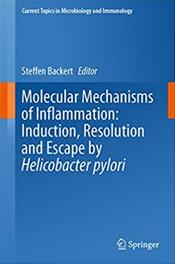|
|
|
|
|

|
| Available: Yes* |
| This title does not qualify for any discount. |
|
Other formats:
|
| Edition: | 1st |
| Publisher: | Springer Nature |
| ISBN: | 3-030-15138-7 (3030151387) |
| ISBN-13: | 978-3-030-15138-6 (9783030151386) |
| Binding: | E E Book + ProQuest Ebook Central |
| Copyright: | 2019 |
| Publish Date: | 06/19 |
| Volume: | 421 |
| Weight: | 0.00 Lbs. |
| Subject Class: | AIM (Allergy and Immunology) |
| Return Policy: | Non-Returnable. |
| |
|
| ProQuest Ebook Central�: |
 Please sign in to preview this title
Please sign in to preview this title
|
|
|
| |
| ISSN Series: | Current Topics in Microbiology and Immunology | | Discipline: | Micro/Immuno | | Subject Definition: | Helicobacter pylori | | NLM Class: | QW 154 | | LC Class: | RC799 | | Abstract: | This book focuses on immune reactions and interactions of humans with Helicobacter pylori - a human pathogen connected to gastritis, peptic ulcers and even gastric cancer. With nearly half of the world's population colonized, it has been characterized as one of the most successful pathogens for more than 100,000 years of co-evolution with its host. The respective chapters discuss not only how H. pylori infection is considered a paradigm for persistent bacterial infection and chronic inflammation, but also how the infection might be connected to host protection against gastro-esophageal diseases, asthma, and other allergic disease manifestations. Readers will gain essential insights into the roles of specific factors in the immune response and learn about the impact of genetic polymorphisms on the risk of gastric carcinogenesis. In addition, the book discusses the strategies used by this bacterium, which allow it to colonize specific sites in the stomach, interact with the microbiome, evade immune surveillance and undermine the resolution of inflammation during persistent infection. This volume presents a concise summary of recent advances in the areas of induction, resolution and escape of inflammation, innate and adaptive immunity, gastric disease development, as well as treatment and vaccination against H. pylori. Accordingly, it offers a valuable asset for scientists and clinicians alike. |
|
|
* Subject to ProQuest Ebook Central� availability |
|
|
|
|
|
|
|
Follow Matthews Book Co. on:

Copyright © 2001-2024 Matthews Book Company - All rights reserved. - 11559 Rock Island Ct., Maryland Heights, MO, 63043 - (800) MED-BOOK
Matthews